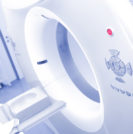A Case Study of Recurrent Prostate Cancer after Proton Beam Therapy

Proton beam therapy for prostate cancer has been struggling with insurance issues because it is significantly more costly than conventional radiation types, yet has not demonstrated better cancer control. However, in the minds of many patients, it offers a better chance at cure... keep reading








